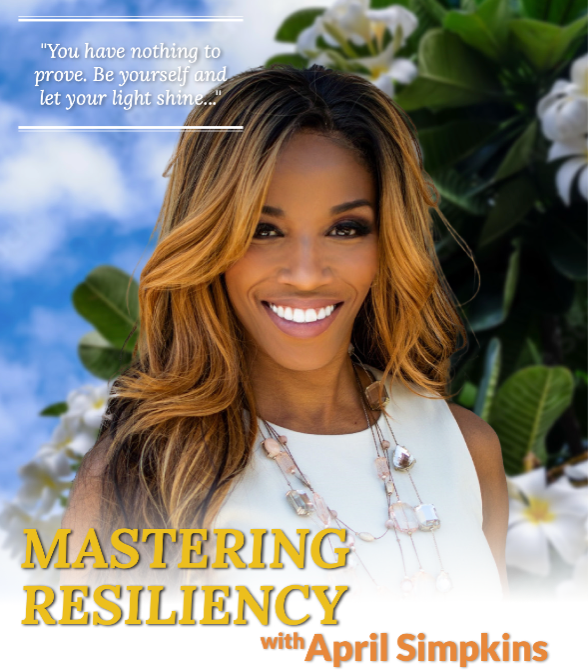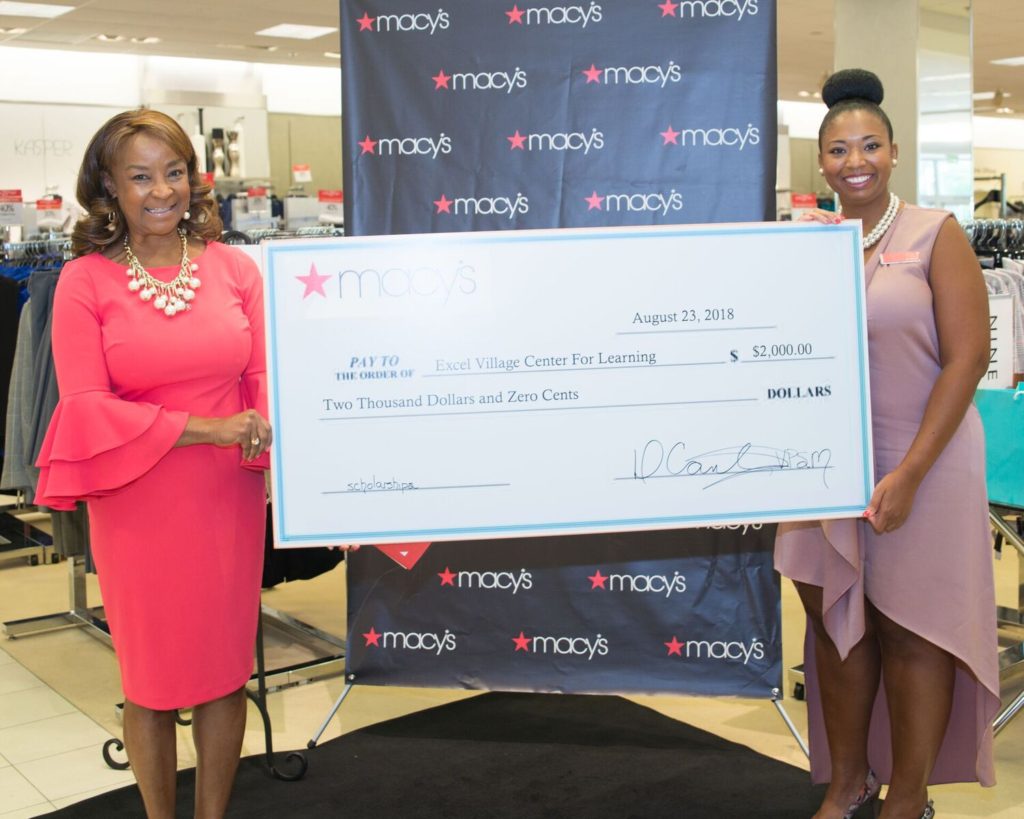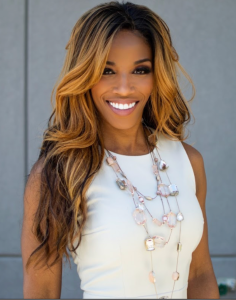
“You have nothing to prove. Be yourself and let your light shine…”
Discover how she’s mastering resiliency and how we can all take care of our mental health at work and beyond.
Here at Career Mastered, we’re pretty big on honoring and celebrating women who take charge. Women who have an iconic presence and power who are making a positive difference and impact on the global business environment. April Simpkins is her.
April is a c-suite executive, workplace strategist, international keynote speaker, author, and mental health advocate working tirelessly in her own way to help make the world a better place in both the professional and personal aspects.
For over three decades, April has been consulting hundreds of businesses on improving workplace cultures, developing effective leadership programs and succession plans, and creating wellness initiatives that increase morale and foster engagement.
Additionally, April is an advocate and amplified voice in the mental health industry, serving as Founder and CEO of the Cheslie C. Kryst Foundation, an ambassador for the National Alliance on Mental Illness (NAMI), a board member for NAMI Piedmont Tri-County, author and international keynote speaker on the topic. She is also the recipient of several awards for her work and community service including the Distinguished Service Award, Fort Mill/Tega Cay Business Person of the Year Award from the York County Regional Chamber, and the recipient of an NAACP Image Awards’ nomination for “By The Time You Read This” a New York Times Bestseller she co-authored with her late daughter, Cheslie Kryst to name a few.
“The best advice I can offer is simple but powerful: Listen.“
Recently, April was one of the featured speakers at our “Brunch with the Masters: Leadership Conversations” event in Charlotte, NC. We had a separate chat with her to learn how she is mastering resiliency and how we all can manage mental health at work and in our daily lives in a more improved way.
Here is what she had to share.
Q: Given your career success, what inspires and motivates you to be resilient?
By nature, I am a high optimist. It’s intrinsic for me to believe that things will get better, no matter how difficult the situation. I’ve learned to leverage that optimism to my advantage, especially in work environments, and it has made me deeply resilient. [Also] the belief that what I’m doing professionally is needed keeps me from allowing setbacks, naysayers, and “no’s” to become roadblocks.
Q: Mental health has been a major part of your advocacy work. Was mental health prioritized for you growing up? When did you first become an advocate?
Mental health was not something prioritized when I was growing up. It wasn’t even a term I was familiar with. I first became an advocate for mental health while working in human resources. Sitting in the HR seat often feels like being an unofficial therapist. Listening to employees share private struggles that inevitably intersected with their workplace performance made it clear to me that mental health is foundational. Over the course of three decades, I committed to better understanding how life impacts our mental wellness — and what we can do about it, especially in the workplace.
Q: How were you able to rise above your own grieving process to become a voice and advocate for mental health? What fuels your mission?
When I was grappling with my own grief, I felt a pain so deep I can’t even put words to it — and that pain needed somewhere to go. It wasn’t in my nature to suppress it, and honestly, I feared that trying to bury those emotions would lead to destructive coping mechanisms, which I didn’t want for myself.
I knew firsthand that dealing with mental illness and depression can leave you feeling isolated, like no one understands the weight you’re carrying. But nothing could be further from the truth.
My ability to rise and stand up is fueled 100% by pain that I have converted into purpose. My mission is to ensure people know they are not alone — that there is hope, there are resources, and there is a community ready to embrace and support them.
Q: What mistakes do people often make when addressing their own mental health or supporting loved ones? What advice would you offer?
One of the most common mistakes people make when addressing their own mental health is convincing themselves that nothing is wrong — that it’s just temporary, that they should “tough it out,” or that no one wants to listen or care.
When trying to support loved ones, people often turn to judgment, which comes across as minimizing — saying things like, “It’s not that bad,” or “You’ve pulled through worse.” That only causes someone to feel unheard and to retreat even further.
The best advice I can offer is simple but powerful: Listen.
Listen with empathy. Understand that whatever someone is sharing is critical to them in that moment. Also, be ready to offer resources — because unless you’re a trained mental health professional, the best thing you can do is guide them toward the help they need.
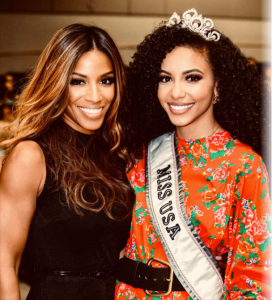
Q: Your book shared a deeply personal look into your life with your daughter Cheslie. What is the biggest lesson her life and legacy taught you? What wisdom would you share with someone experiencing similar thoughts?
The greatest lesson Cheslie’s life and legacy taught me is the importance of waking up each day and fighting for that day. Not worrying about five years down the road, or even tomorrow — but focusing on what you need to support yourself today.
Cheslie lived fully. She didn’t hold back — and it felt like she lived four lifetimes in one. That boldness, that fullness, is something we should all take to heart.
The wisdom I would share with someone experiencing similar thoughts is this: You are worth fighting for. If you are battling a mental illness, please know you are not alone. Those overwhelming thoughts can feel like a record stuck on loop — but connecting with a supportive community can break that cycle and give you a new tune. Sound your alarm. Get the help you need. Not someday — but today.
Q: What simple practices have you found beneficial for maintaining healthy mental and emotional well-being?
Because we spend at least a third of our lives at work, I’m passionate about mental health in the workplace.
One simple but powerful practice: Use your PTO. Take a day off, not for a vacation or obligations, but simply to rest and recalibrate your nervous system.
Do whatever brings you peace — by your standards, not anyone else’s. Whether it’s sitting quietly in a park with your phone off, sleeping in and playing with your dog, or listening to your grandchildren laugh, lean into whatever restores your spirit.
Another practice I highly recommend is getting outside and walking.
There’s a therapeutic element to walking outdoors — some mental health professionals liken it to EMDR
therapy, where the natural eye movement helps process emotions and trauma. Walking in fresh air and sunlight allows you to gently unpack and process the things you’ve tucked away.
Q: Where can people find your book or learn more about working with you?
You can find me at aprilsimpkins.com, where you’ll find links to purchase the book. It’s available through all major outlets, especially online. You can also visit the book’s website at bythetimeyoureadthisbook.com.
Q: Is there anything else you’d like to share that we haven’t addressed?
Yes.
Many of us wear masks at work — sometimes because our roles demand it if we’re client-facing, sometimes out of fear that showing our true selves might impact our opportunities.
And sometimes we wear a mask because we are battling a mental health challenge and feel ashamed.
But hear this clearly: It is okay to not be okay.
It’s critical to have a plan for those moments when the strain becomes too much. Maybe it’s texting a trusted friend for a few words of encouragement, reciting an affirmation that grounds you, or simply stepping outside for five minutes of fresh air.
Whatever your plan looks like, have one — because you are worth that care.
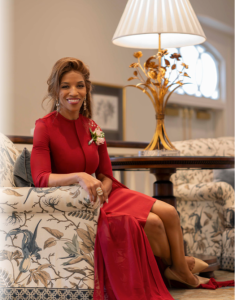
“But hear this clearly: It is okay to not be okay.”
Q: What’s next for you, your business, or your advocacy work?
I’m thrilled to share that I’m launching a podcast in May 2025 called As I Was Saying with April Simpkins! I couldn’t be more excited. I’ll be discussing a topic close to my heart: mental health in the workplace. We’ll talk about work, life, and the critical importance of giving ourselves permission to care for our mental health while managing the demands of a nine-to-five.
In my advocacy work, I’m proud to be the founder of the Cheslie C. Kryst Foundation, which is dedicated to blending mental health and wellness with creativity. This mission is inspired by Cheslie herself—an incredibly talented creative writer, clothing designer, pianist, violinist, and more. Like many, she leveraged creativity as a therapeutic outlet to support her mental well-being.
There is a wealth of science behind the positive impact of creative expression on mental health, and the Cheslie C. Kryst Foundation is proud to champion these efforts. You can learn more at CheslieCKrystFoundation.org. Great things are coming!
Additionally, I will continue speaking to audiences about mental health in the workplace, and I’ve also returned to consulting. Please visit my website to learn more.
Q: What parting advice would you give women who want to master their careers?
I would say this: as women, we often carry the extra burden of feeling like we constantly have to prove ourselves.
My advice is simple—you are enough.
You have nothing to prove. Be yourself and let your light shine, not for the approval of others, but because you know your worth. You know the value you bring. Stay dedicated to your mission of being the best, most vibrant version of yourself. You are already everything you need to master your career.
Jasmine Ball is a wife, mom, award-winning journalist, and founder of BTM Writing Services. Throughout her career, she’s been helping companies all over the world get confidence over their content and grow their businesses. With God at the center, Jasmine’s life mission is to use her gift to connect people to resources that will help them live more informed, inspired, and overall better lives.

